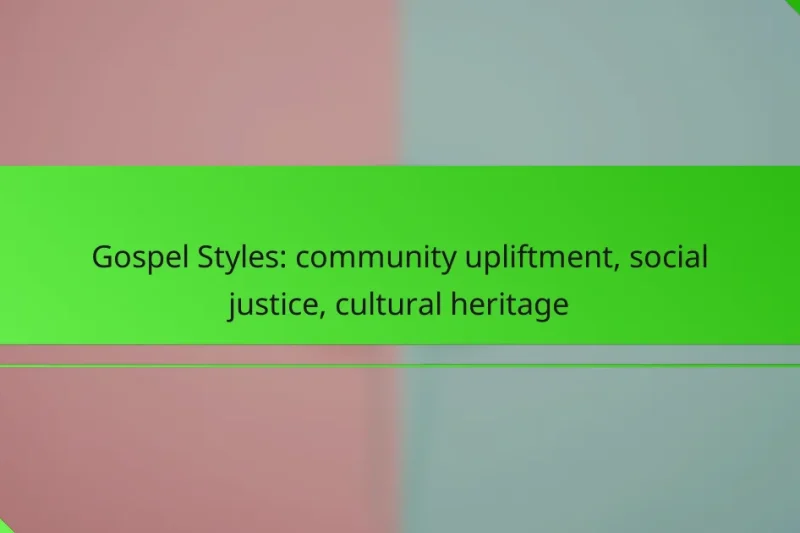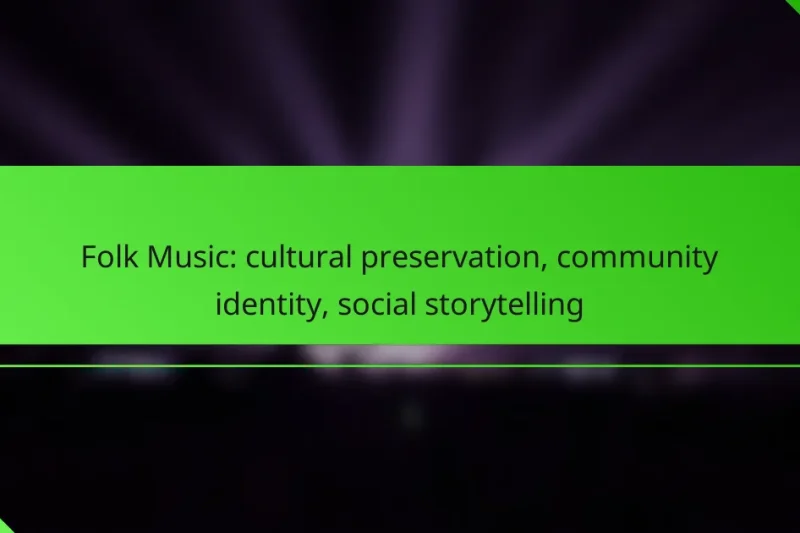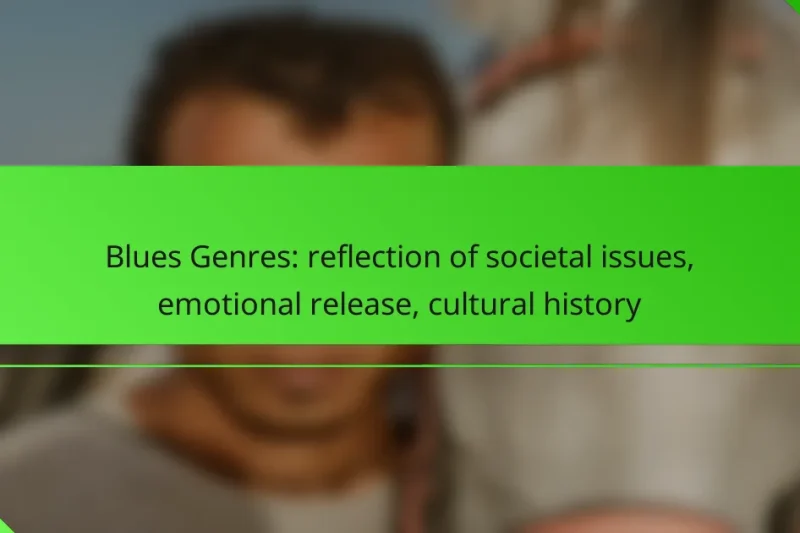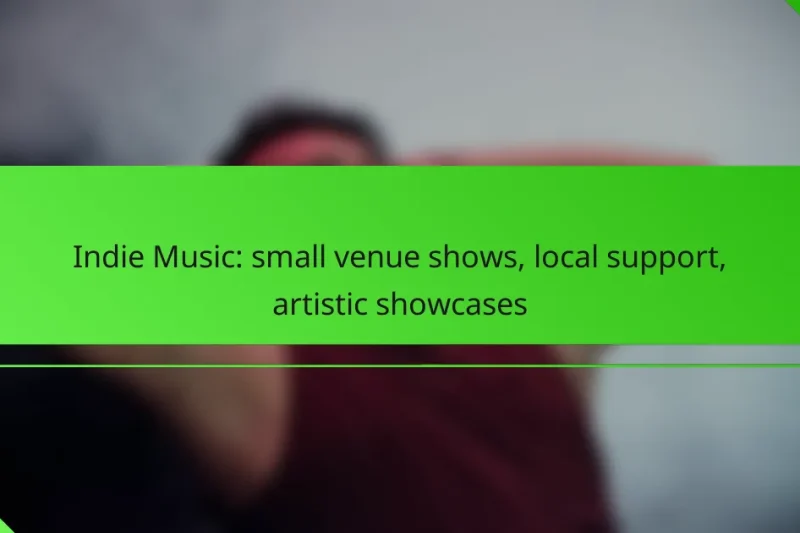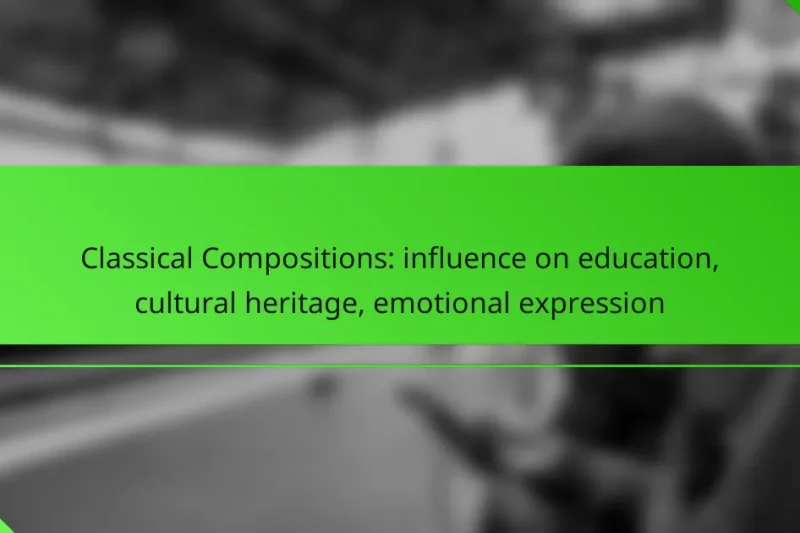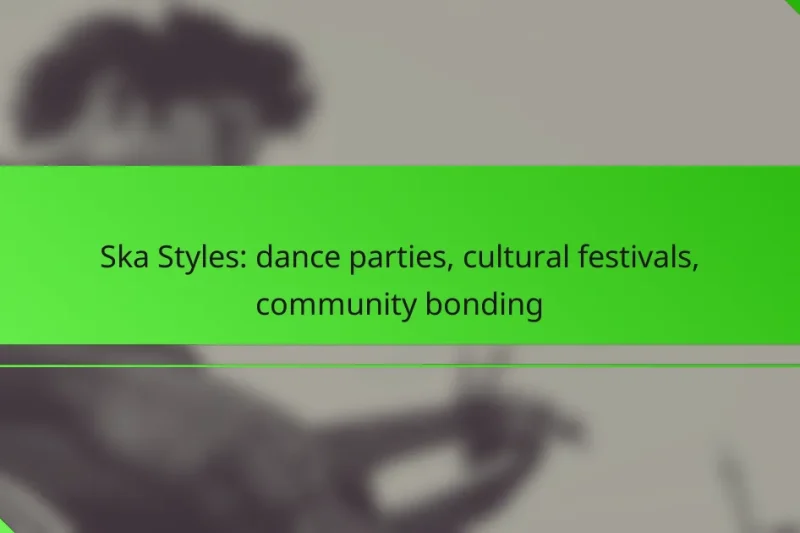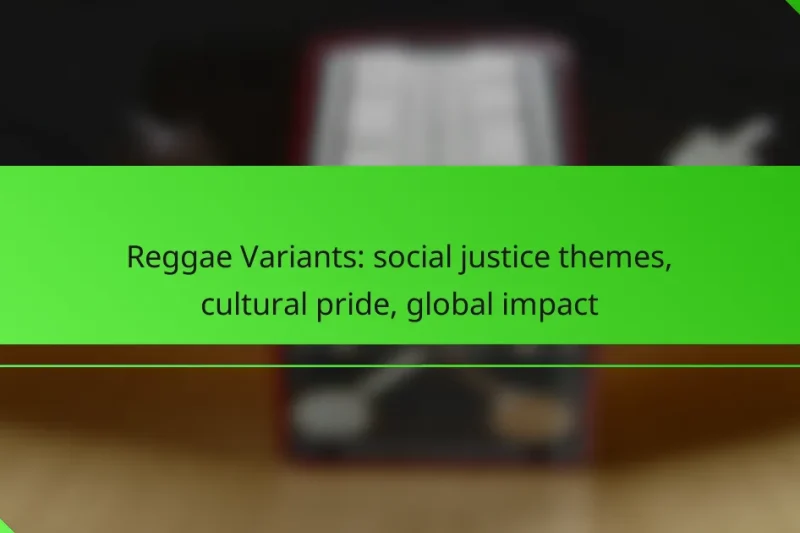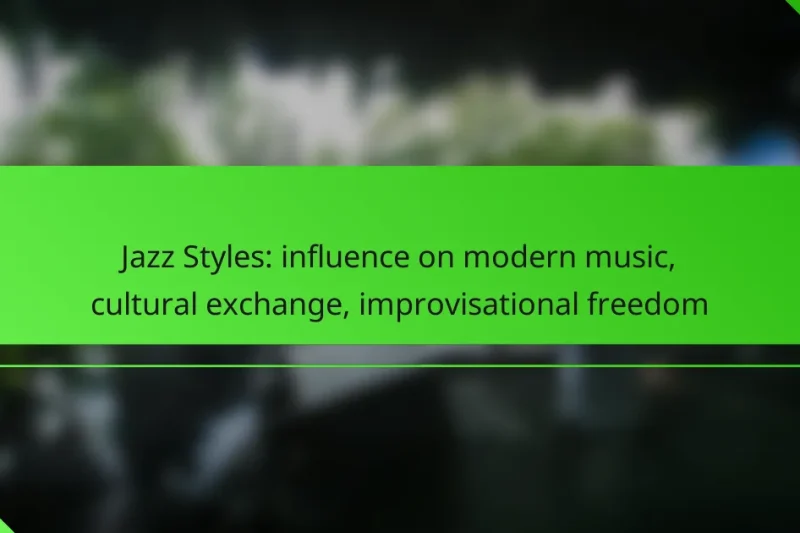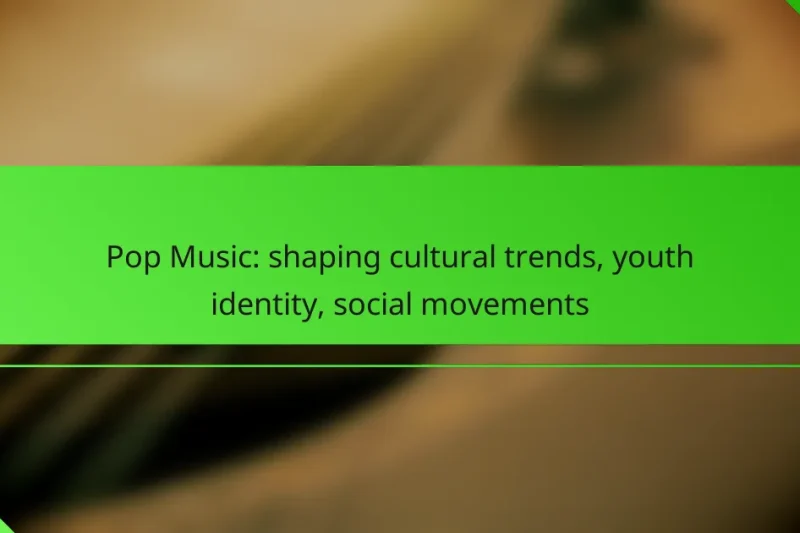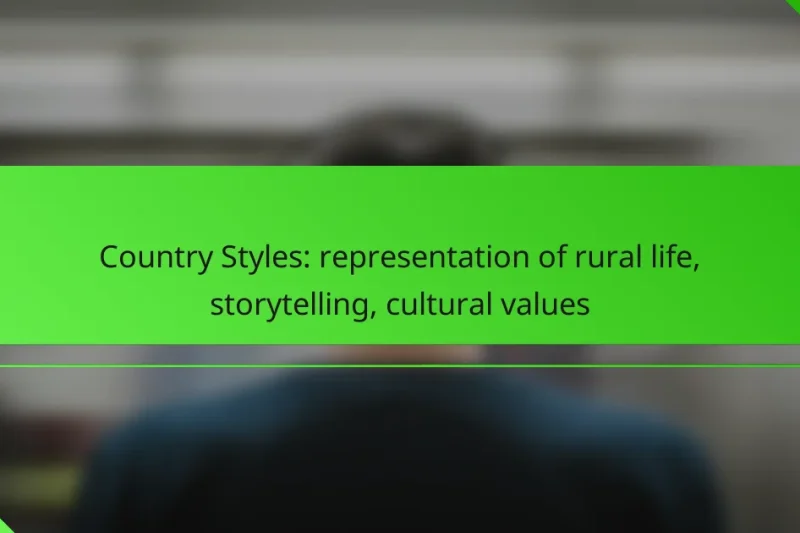Gospel music in the UK is a vibrant expression of community upliftment, social justice, and cultural … Gospel Styles: community upliftment, social justice, cultural heritageRead more
Understanding the Impact of Music Genres
Music genres play a crucial role in influencing consumer behavior, particularly in the UK, where they shape purchasing habits and brand interactions. By understanding the preferences associated with popular genres like pop, rock, and indie, businesses can tailor their marketing strategies to resonate with specific demographics, ultimately enhancing customer engagement and brand loyalty.
Folk Music: cultural preservation, community identity, social storytelling
Folk music plays a crucial role in cultural preservation, capturing the stories and traditions of communities … Folk Music: cultural preservation, community identity, social storytellingRead more
Blues Genres: reflection of societal issues, emotional release, cultural history
Blues genres serve as a poignant reflection of societal issues, articulating the struggles and emotions of … Blues Genres: reflection of societal issues, emotional release, cultural historyRead more
Indie Music: small venue shows, local support, artistic showcases
Indie music thrives in small venues, where intimate performances create a unique connection between artists and … Indie Music: small venue shows, local support, artistic showcasesRead more
Classical Compositions: influence on education, cultural heritage, emotional expression
Classical compositions play a vital role in education by enriching music curricula and enhancing cognitive abilities, … Classical Compositions: influence on education, cultural heritage, emotional expressionRead more
Ska Styles: dance parties, cultural festivals, community bonding
Ska music serves as a vibrant catalyst for community bonding, bringing people together through lively dance … Ska Styles: dance parties, cultural festivals, community bondingRead more
Reggae Variants: social justice themes, cultural pride, global impact
Reggae music serves as a dynamic platform for social justice, addressing critical issues like inequality and … Reggae Variants: social justice themes, cultural pride, global impactRead more
Jazz Styles: influence on modern music, cultural exchange, improvisational freedom
Jazz has profoundly shaped modern music by infusing its improvisational techniques and complex rhythms into a … Jazz Styles: influence on modern music, cultural exchange, improvisational freedomRead more
Pop Music: shaping cultural trends, youth identity, social movements
Pop music plays a vital role in shaping cultural trends and youth identity, offering a dynamic … Pop Music: shaping cultural trends, youth identity, social movementsRead more
Country Styles: representation of rural life, storytelling, cultural values
Country styles serve as a vibrant representation of rural life, emphasizing traditional practices and community engagement … Country Styles: representation of rural life, storytelling, cultural valuesRead more
How do music genres influence consumer behavior in the UK?
Music genres significantly shape consumer behavior in the UK by affecting purchasing habits and brand interactions. Different genres resonate with distinct demographics, leading to varied preferences that brands can leverage for marketing strategies.
Genre preferences drive purchasing decisions
Consumers often align their purchases with their favorite music genres. For example, fans of pop music may be more inclined to buy products endorsed by pop artists, while rock enthusiasts might prefer brands that resonate with their musical tastes. This alignment can lead to increased sales for brands that effectively target genre-specific audiences.
Understanding genre preferences allows brands to tailor their marketing efforts. For instance, a clothing line might collaborate with a popular hip-hop artist to attract younger consumers who identify with that genre. This strategy can enhance brand visibility and drive sales.
Emotional connections affect brand loyalty
Music genres create emotional connections that can significantly influence brand loyalty. When consumers associate a brand with a particular genre, they often develop a sense of belonging and attachment. This emotional bond can lead to repeat purchases and long-term loyalty.
Brands that successfully tap into these emotional connections can foster a dedicated customer base. For example, a beverage company that sponsors music festivals featuring indie artists may attract loyal customers who feel a personal connection to the brand through their favorite music. This strategy not only enhances brand loyalty but also encourages word-of-mouth promotion among fans.
What are the most popular music genres in the UK?
The most popular music genres in the UK include pop, rock, and indie, with pop music leading in sales and streaming. These genres reflect diverse tastes and cultural influences, shaping the music landscape significantly.
Pop music dominates sales
Pop music is the leading genre in the UK, consistently topping charts and driving sales. Artists like Ed Sheeran and Dua Lipa have achieved significant commercial success, often selling millions of albums and generating high streaming numbers.
In 2022, pop music accounted for a substantial portion of total music sales, with many tracks reaching the top of the UK Singles Chart. This genre’s broad appeal is enhanced by its catchy melodies and relatable lyrics, making it a favorite among various age groups.
Rock and indie genres maintain strong followings
Rock and indie music continue to have dedicated fan bases in the UK, with bands like Arctic Monkeys and Coldplay sustaining popularity over the years. These genres often attract audiences through live performances and festivals, contributing to their enduring presence in the music scene.
While not as commercially dominant as pop, rock and indie music have a loyal following that appreciates the authenticity and artistry often associated with these genres. Many listeners seek out smaller venues and independent labels, supporting local artists and fostering a vibrant music community.
How can businesses leverage music genres for marketing?
Businesses can effectively leverage music genres for marketing by aligning their brand identity with specific musical styles that resonate with their target audience. This approach can enhance customer engagement and create a memorable brand experience.
Targeted playlists enhance customer experience
Creating targeted playlists that reflect the preferences of your customer base can significantly improve their experience. For instance, a coffee shop might play indie acoustic tracks to create a cozy atmosphere, while a gym could opt for high-energy electronic music to motivate clients during workouts.
Consider curating playlists for different times of day or specific events, such as relaxing tunes during morning hours and upbeat tracks during peak times. This strategy not only enhances the ambiance but also encourages longer visits and repeat business.
Brand partnerships with artists boost visibility
Partnering with artists from specific music genres can elevate a brand’s visibility and credibility. Collaborations can include sponsored events, exclusive music releases, or co-branded merchandise that appeals to fans of the artist.
For example, a beverage company might team up with a popular hip-hop artist for a limited-edition drink, tapping into the artist’s fanbase and creating buzz. Such partnerships can lead to increased social media engagement and brand loyalty among music enthusiasts.
What role does music genre play in event planning?
Music genre significantly influences event planning by shaping the atmosphere and audience expectations. Selecting the right genre can enhance engagement, set the tone for the event, and attract the desired demographic.
Genre selection impacts audience engagement
The choice of music genre directly affects how engaged the audience feels during an event. For instance, upbeat genres like pop or electronic dance music tend to energize crowds, while genres like jazz or classical may create a more relaxed atmosphere. Understanding the target audience’s preferences is crucial for maximizing participation and enjoyment.
Event planners should consider conducting surveys or analyzing past event data to determine which genres resonate most with their audience. This approach can lead to higher satisfaction rates and increased likelihood of repeat attendance.
Live performances influence ticket sales
Live performances featuring popular music genres can significantly boost ticket sales. Events showcasing well-known artists or trending genres often sell out quickly, as fans are eager to experience their favorite music live. Additionally, the reputation of the genre can attract a broader audience, increasing overall attendance.
To optimize ticket sales, planners should monitor current music trends and consider booking artists who align with those trends. Offering early bird pricing or group discounts can also incentivize ticket purchases and enhance overall sales performance.
How do music genres affect streaming platform success?
Music genres significantly influence the success of streaming platforms by shaping user preferences and engagement. Platforms that cater to specific genres often see higher user retention and increased subscription rates.
Genre-specific playlists drive user retention
Curated playlists that focus on specific genres can enhance user experience and keep listeners engaged. For instance, platforms like Spotify and Apple Music create genre-based playlists that cater to niche audiences, which can lead to longer listening times and reduced churn rates.
Offering personalized playlists based on listening habits can further boost retention. Users are more likely to stay subscribed if they feel the platform understands their musical tastes and consistently provides relevant content.
Data analytics inform genre trends
Streaming platforms utilize data analytics to track user behavior and identify emerging genre trends. By analyzing listening patterns, platforms can adjust their offerings to align with popular genres, ensuring they remain competitive in a rapidly changing market.
For example, if data shows a rise in interest for a specific genre, platforms can quickly create targeted marketing campaigns or develop new playlists to capitalize on that trend. This proactive approach helps maintain user interest and attract new subscribers.
What are the emerging trends in music genres?
Emerging trends in music genres reflect a dynamic landscape where innovation and cultural influences shape listening habits. Notably, fusion genres and local music scenes are becoming increasingly significant in the industry.
Fusion genres are gaining popularity
Fusion genres combine elements from different musical styles, creating unique sounds that appeal to diverse audiences. For example, genres like reggaeton, which blends Latin rhythms with hip-hop, and country rap are examples of this trend.
Artists are experimenting with various influences, leading to a rich tapestry of music that often crosses traditional boundaries. This trend allows musicians to reach broader demographics and engage listeners who appreciate eclectic sounds.
Increased interest in local music scenes
There is a growing interest in local music scenes, where regional artists gain recognition for their unique sounds and cultural narratives. This trend is fueled by social media and streaming platforms that promote local talent, making it easier for listeners to discover music from their own communities.
Local music festivals and events are becoming popular, showcasing homegrown artists and fostering a sense of community. This shift not only supports local economies but also enriches the overall music landscape by highlighting diverse cultural expressions.
How can understanding music genres enhance e-commerce strategies?
Understanding music genres can significantly enhance e-commerce strategies by tailoring marketing efforts to align with customer preferences. By analyzing genre-specific trends, businesses can create targeted campaigns that resonate with their audience, ultimately boosting engagement and sales.
Personalized recommendations improve sales
Personalized recommendations based on music genres can lead to higher sales by providing customers with relevant product suggestions. When e-commerce platforms analyze users’ music preferences, they can recommend items that align with those tastes, increasing the likelihood of purchase.
For example, a user who frequently listens to indie rock may respond positively to merchandise related to that genre, such as vinyl records or band apparel. Implementing algorithms that track listening habits can help businesses refine their recommendations, making them more effective.
To maximize the impact of personalized recommendations, e-commerce sites should regularly update their algorithms and consider seasonal trends in music. Avoid generic suggestions and focus on niche genres that may appeal to specific customer segments, ensuring a more engaging shopping experience.
